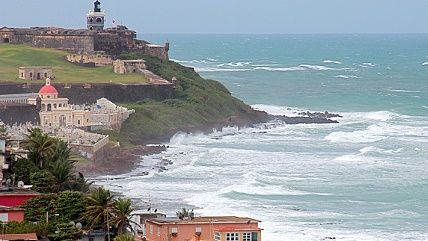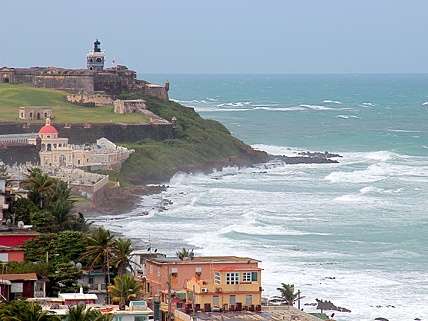Where Puerto Rico Went Wrong
Long-term reform is needed.


Stop me if you've heard this one before: A government, run by a succession of politicians, spent frivolously for decades and repeatedly ignored all the warning signs of looming fiscal disaster, and now that it has arrived, is begging for a bailout. No, I'm not talking about Greece. This time, it's Puerto Rico. And the Republican-controlled Congress is seriously considering a bailout.
Even Washington's out-of-touch cronies recognize that a simple cash bailout would be too politically toxic. But they've come up with an alternative that may have some appeal but also has very problematic features: bankruptcy.
It's not hard to see where Puerto Rico went wrong. About one-third of its working population works for the government. Its bloated workforce accounts for more than two-thirds of the budget, while onerous labor laws and regulations strangle the economy and prevent it from keeping pace with the growth of government. Compared to the island's lower standard of living, generous federal welfare benefits also contribute to an extremely low 50 percent participation rate in the labor force. That, along with the high shipping costs imposed by the Jones Act, are problems that Congress can help solve, but the rest is up to Puerto Rico itself.
The appeal of bankruptcy is that, in theory, it lets municipalities get out of the bad contracts that are causing the financial problems, such as excessive pension promises. Puerto Rico, like the District of Columbia, is not granted access to Chapter 9 bankruptcy under federal law. Hence, the call to change the law.
However, bankruptcy is never the silver bullet people make it out to be. For better or worse, the absence of bankruptcy authority is the legal framework under which creditors purchased bonds and lent the territory the more than $70 billion in debt it's accumulated. To retroactively change the rules and allow Puerto Rico and its public-sector corporations shed their obligations would be to undermine the rule of law.
Treasury Secretary Lew recently urged Congress to pair a control board or other fiscal oversight mechanism with an "orderly process to restructure its debts." But the commonwealth can already negotiate with creditors to restructure debt, and in at least one instance has already done so when the Puerto Rican Electric Power Authority—one of the island's biggest debtors—negotiated down its debt by reaching a deal with bondholders.
What Lew is asking for is the ability to unilaterally rewrite terms and stiff creditors by leaving them with pennies on the dollar. Moreover, politics usually still dominates the process as we saw in Detroit, where the creditors' priorities were ignored to serve powerful interest groups. This is why a strong and principled control board is so important. But can we trust today's Congress to really play that role?
Unfortunately, in case of failure, the consequences could be long lasting. Puerto Rico's investors already know that they made a bad investment and won't get repaid. But by changing the rules of the game, they may be scared to invest in Puerto Rico for years to come, too.
To be sure, as my colleague Maurice McTigue rightly points out, it's the creditors that facilitated Puerto Rico's bad debt habits by lending to a profligate spender without a good revenue source. Many were retail investors wooed to buy bonds because of the tax exemption and probably had no clue about Puerto Rico's fiscal state.
There's also the matter of incentives. Right now, they're biased toward fiscal irresponsibility on the part of the government. Lew's policy may only sharpen the bias against fiscal stewardship and undermine the likelihood of seeing real fiscal reforms. Indeed, the ability to substitute the dismissal of contractually agreed upon debt obligations for budget cuts is more temptation than politicians can resist and undermines incentives to fix what really ails Puerto Rico.
From the taxpayer's point of view, there's no denying that allowing bankruptcy is better than a bailout. However, the only real path forward for Puerto Rico is to finally address its fiscal mismanagement while unleashing its economy through pro-growth reforms. Bankruptcy poorly executed may slow down that process and lead to more fiscal craziness. If that's the case, taxpayers may have to foot the bill for a bailout after all.
COPYRIGHT 2016 CREATORS.COM
Editor's Note: As of February 29, 2024, commenting privileges on reason.com posts are limited to Reason Plus subscribers. Past commenters are grandfathered in for a temporary period. Subscribe here to preserve your ability to comment. Your Reason Plus subscription also gives you an ad-free version of reason.com, along with full access to the digital edition and archives of Reason magazine. We request that comments be civil and on-topic. We do not moderate or assume any responsibility for comments, which are owned by the readers who post them. Comments do not represent the views of reason.com or Reason Foundation. We reserve the right to delete any comment and ban commenters for any reason at any time. Comments may only be edited within 5 minutes of posting. Report abuses.
Please to post comments


Dang. A government borrowing money, then changing the rules to stiff the creditors. I guess the proggies are right -- businessmen are greedy and stupid and naive and pig-ignorant. Maybe I will vote for Bernie after all. With Hillary as his VP, and Fauxchahontas as Secretary of the Treasury, we can turn this country around!
Ignore the rule of law and allow for special treatment of certain groups? No we couldn't do that.
Is it just me or does being a Progressiv nowadays mean that laws just mean or government betters just get to do whatever they want.
Damn phone ... our government betters ...
And add an e to Progressive
The Politburo spelling mistak is appropriate. Don't apologize, comrad!
Stop me if you've heard this one before: A government, run by a succession of politicians, spent frivolously for decades and repeatedly ignored all the warning signs of looming fiscal disaster, and now that it has arrived, is begging for a bailout. No, I'm not talking about Greece. This time, it's Puerto Rico.
Darn, I was guessing the U.S.!
How about if the US says to Spain, "oops we are sorry for that whole Spanish American War thing, here we are giving you Puerto Rico back, no hard feelings".
Okey-Dokey w/me, so long as the Spanish will ALSO take Greece off of the hands of the Germans, and California and all of the proggies off of the hands of the USA...
Hey, hey, hey.
I'm a native Californian and I'm not going anywhere!
just before I saw the receipt that said $7527 , I accept that my mom in-law woz like actualey making money in there spare time from there pretty old laptop. . there aunt had bean doing this for less than twentey months and at present cleared the depts on there appartment and bourt a great new Citro?n 2CV . look here.......
Clik This Link inYour Browser.
???????? http://www.Jobstribune.com
A basic problem with Puerto Rico just like with Indian Reservations is that they are undesirable for investments because they are neither fully part of the US, nor are they fully independent. You can become a full citizen of a place like Ecuador and they have a strong interest in attracting investment. But you can't realistically become "native American" or "Puerto Rican", and Puerto Rico and reservations are run at the whim of activists, special interests, and federal politicians.
My last pay check was $9500 working 12 hours a week online. My sisters friend has been averaging 15k for months now and she works about 20 hours a week. I can't believe how easy it was once I tried it out. This is what I do..
Clik This Link inYour Browser....
??????? http://www.netjoin10.com
A large part of why they're talking about changing the law is that Puerto Rico is on really weird ground. It's not quite a territory, but it's not a state either. So the normal rules/laws/so-on that would provide us a path out of this aren't there.
My preferred solution? Give Puerto Rico a choice: Territory, state, or fully independent nation. This nebulous not-quite-sovereign status is no longer tenable.
I'd narrow that to full state or independence. Territories etc. don't work well as constructs either.
Let's just cut 'em loose. Do we really need another leftists controlled State? I don't think it's such a good idea. So, adios to Puerto Rico, the only way they'd turn around.
I say cut that island loose, I know it's unrealistic but let them be on their own, but then again it's partly the federal governments fault because they have generously given Puerto Rico sickening amounts of welfare benefits. An all around sucksass situation.
If cut loose (cut free?) PR could compete for the recreational sex/drug/gambling/beach trade against Cuba. They could become an even cheaper cuba than cuba making my discretionary recreation dollars go much further. Couple that with secure banking that does not report to governments and they could be winners.
I'm making $86 an hour working from home. I was shocked when my neighbour told me she was averaging $95 but I see how it works now. I feel so much freedom now that I'm my own boss. This is what I do,
--------------------- http://www.richi8.com
year. In this year till now I have earned 66k dollars with my pc, despite the fact that I am a college student. Even
newbies can make 39 an hour easily and the average goes up with time. Why not try this.
Clik This Link inYour Browser.......
? ? ? ? http://www.workpost30.com
" Treasury Secretary Lew recently urged Congress to pair a control board or other fiscal oversight mechanism ..."
I understand some Top Men from Flint will be available soon...
Well, of course, just like personal bankruptcy, spending habits have to change, or you'll be back in the same mess you were in before bankruptcy. But maybe that's too obvious a point for Congress to understand...
Bankruptcy laws are still too lax. Bring back debtors prisons. That'll show 'em!
valentines day Shayari
valentines day Statusffbfgnfgn gnghmhjh,h,